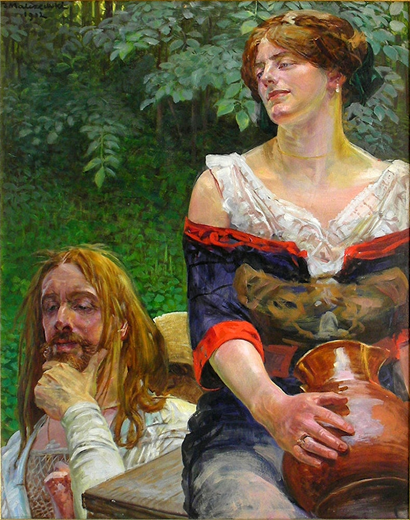Malcezewski, Jacek - VM - William Collen
Jacek Malcezewski: Christ and the Samaritan Woman

How are you going to get water for me?
by William Collen
Jacek Malcezewski was a Polish painter active in the decades surrounding the turn of the twentieth century. His canvases frequently depict scenes from stories and mythology and he painted a series of works on the theme of “Christ and the Samaritan Woman” between 1909 and 1912.
In this image the traditional depictions of Jesus’ conversation with the woman at the well are turned on their head. Here we aren’t given an imposing, authoritative Jesus pontificating to the woman, such as he is commonly displayed when this theme is represented in art. Instead Malcezewski’s Jesus is shoved into a corner and the Samaritan woman dominates the canvas. I imagine this picture shows the moment (John 4:11) where she says, “Oh come on. You don’t even have a bucket. How are you going to get water for me?” Her smirk indicates that she thinks she’s scored a point on Him. Meanwhile Jesus pauses to respond. But isn’t that the exact dynamic of the first part of their conversation, as recounted in the book of John?
In fact, this picture shows precisely who Jesus seemed to be to the Samaritan woman – some random guy who just started talking to her, while she was busy getting water. The neighborhood wells were probably centers of chitchat, gossip, and flirty banter anyway and to the woman Jesus’ request for water probably wasn’t out of the ordinary for a trip to the well. The gospel narrative shows that this water run certainly didn’t end in a normal fashion for her! But that moment, just before her life was turned inside out by the teacher who told her “all the things she ever did”, is perfectly captured in this painting.
It is important to remember who Jesus would have appeared to be to his contemporaries. We get glimpses of His public persona in the gospels. The rich young ruler calls Jesus “good teacher” but Jesus’ neighbors from Nazareth dismiss Him as “the carpenter’s son.” Undoubtedly Jesus was a quasi-public figure, notable enough to attract the attention of the Pharisees who sought to kill Him. But when He visited Samaria, He was practically unknown. We, reading the gospel account of the Samaritan woman’s conversation with Jesus, get to experience the irony of knowing who He is before she does. Malcezewski’s painting helps us envision what the encounter would have been like to the Samaritan Woman herself.
*******
Jacek Malcezewski: Christ and the Samaritan Woman, 1912, oil on plywood, 92 x 72.5 cm. Borys Voznytskyi Lviv National Art Gallery, Ukraine, the largest art museum in Ukraine. It contains works by Ukrainian, Polish, Italian, French, German, Dutch and Flemish, Spanish, Austrian and other European artists.
Jacek Malcezewski (1854-1929) was a Polish symbolist painter who is one of the most acclaimed painters of Poland, associated with the patriotic Young Poland (Młoda Polska) school of painting, following more than a century of partitions of Poland by Russia, Prussia and Austria and inspiring the revival the Romantic tradition. He is regarded as the father of Polish Symbolism. Themes in his creative output include historical motifs of Polish martyrdom, romantic ideals of independence, Christian and Greek mythology, national folk art, as well as his love of the beauty of his country’s landscape.
William Collen is an art writer and researcher from Omaha, Nebraska. His writings can be found at www.ruins.blog.
ArtWay Visual Meditation June 12, 2022


